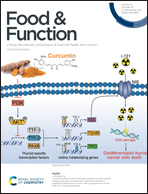Structural characteristics of Gracilaria lemaneiformis oligosaccharides and their alleviation of dextran sulphate sodium-induced colitis by modulating the gut microbiota and intestinal metabolites in mice
Abstract
Ulcerative colitis (UC) is a chronic lifetime disorder with a high incidence worldwide. A functional food-based method to prevent UC would be a good option for disease control. G. lemaneiformis oligosaccharides (GLOs) should have potent benefits for the gastrointestinal tract, based on in vitro fermentation assessed in our previous study. This study evaluated the therapeutic potential of GLOs in UC, as well as their possible mechanisms of action. The administration of GLOs was able to reduce the severity of dextran sulphate sodium-induced colitis by protecting mice from weight loss, reductions in colon length, inflammatory infiltration, and colon damage. Gut microbiota composition analysis showed that at the phylum level, GLOs could restore the composition of Bacteroidetes and decrease the level of Firmicutes. Consistently, it increased the contents of beneficial microbial metabolites and short-chain fatty acids in the mouse colitis model. In conclusion, GLOs could comprise a promising functional food strategy to alleviate UC symptoms.



 Please wait while we load your content...
Please wait while we load your content...